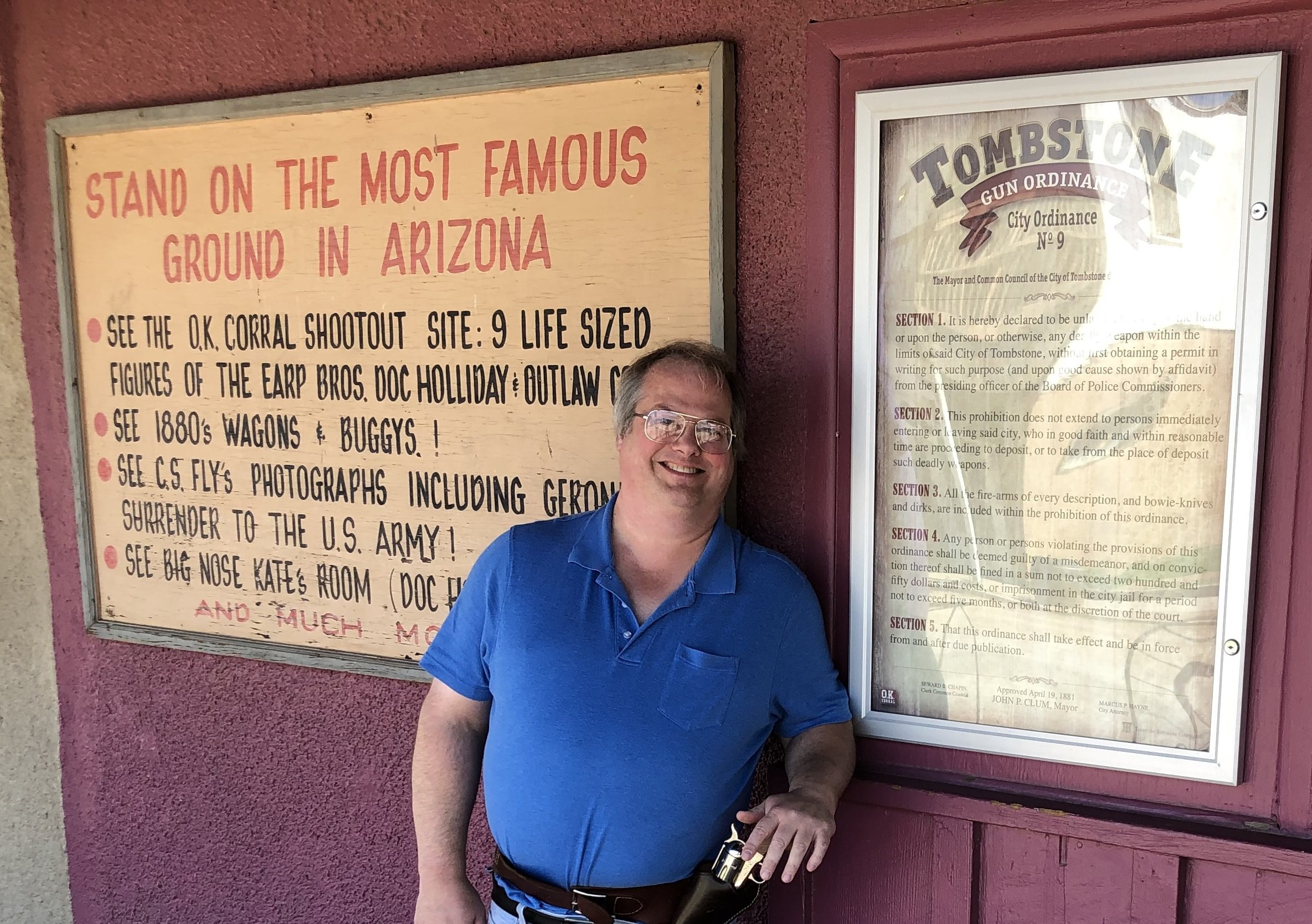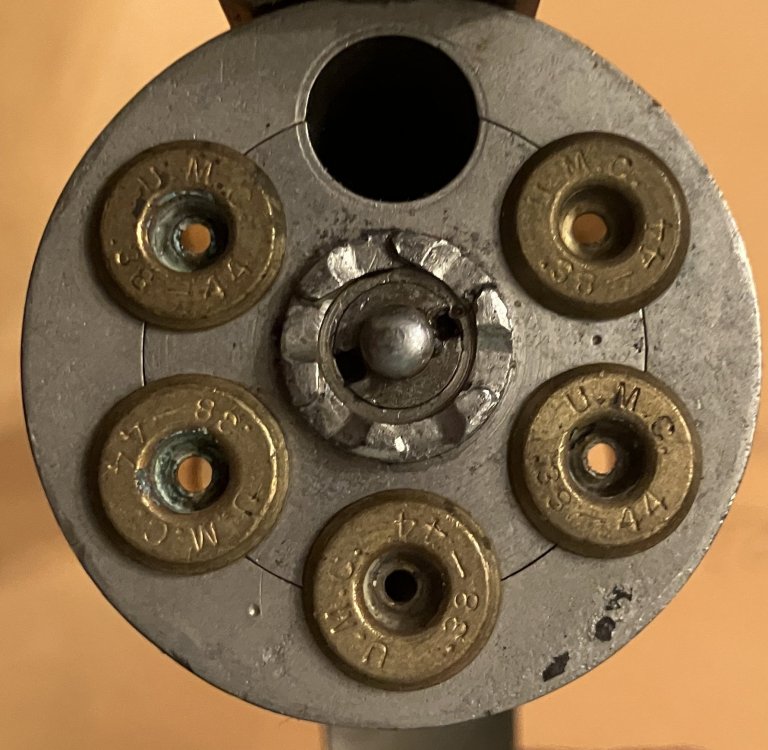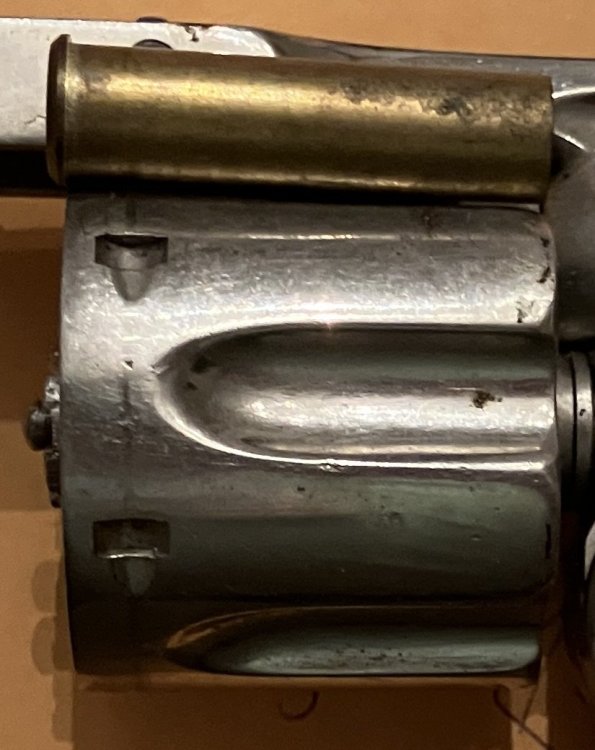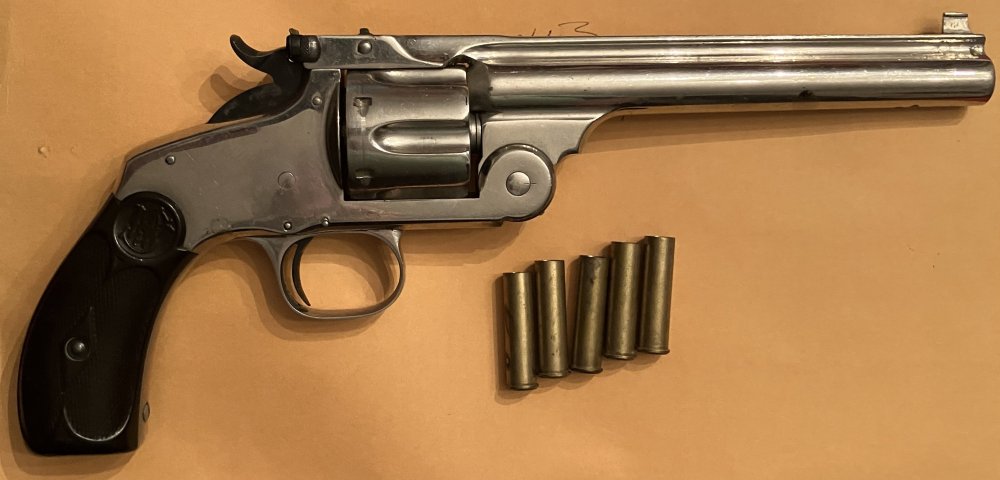-
Posts
8,113 -
Joined
-
Last visited
-
Days Won
1
Content Type
Profiles
Forums
Events
Everything posted by H. K. Uriah, SASS #74619
-
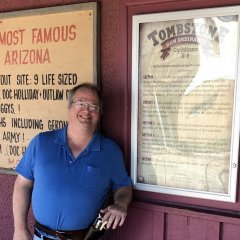
A "Marlin" Mares Leg by Chiappa
H. K. Uriah, SASS #74619 replied to H. K. Uriah, SASS #74619's topic in SASS Wire Saloon
I don't believe in the metric system. It does not exist. -
As we all know, there are replicas of the Winchester 94 on the market with no safeties and top eject. These are in "competition" with the ones made by Winchester in Japan with all of those features. Does anyone make a replica of any of the Marlin rifles to compete with the Marlin's made by Ruger? I know Chiappa is marketing a .22 that bears a visual resemblance to the 1897-39A family, but I am talking something a main match caliber.
-

MA/CT/RI Tri-State in ME this weekend!
H. K. Uriah, SASS #74619 replied to H. K. Uriah, SASS #74619's topic in SASS Wire
I type corrected. I thought NH and VT had a combined match. Seems that is not the case. I could swear they used too, and I know went to it one year. But maybe I am mis-remembering and it was just NH. -

MA/CT/RI Tri-State in ME this weekend!
H. K. Uriah, SASS #74619 replied to H. K. Uriah, SASS #74619's topic in SASS Wire
Yes, Maine has its own match. It's in a few weeks. NH/Vermont also have a combined one. There were more people from NH than any one state at the shoot. There were more people from outside the Tri-State area than from within it! As to why the shoot was held in Maine, it used to be held in Massachusetts. To oversimply things, recent changes to Massachusetts gun laws make it illegal for out of state people to posses a firearm in Massachusetts, unless they have a Massachusetts Licence to Carry Firearms. This made it a crime for people from CT or RI to come to the shoot in Mass. You can pass through, but you can't stop. There are of course some additional details, but for the sake of this event, that's the relevant part in a nutshell. -

A "Marlin" Mares Leg by Chiappa
H. K. Uriah, SASS #74619 replied to H. K. Uriah, SASS #74619's topic in SASS Wire Saloon
Oh, I agree that from a practical standpoint, the Mares Leg type pistol has none whatsoever. But from a FUN standpoint, you can hardly beat them. I really need to add this one to the above picture... That's am 86, made by Chiappa, with a 16.6" barrel., and yes, it's a .45-70, but it will work with the cartridge on the left, a .45-70 cut back to .45 Colt length. I call it the .45-45. If the SHORT act passes, this barrel will shorten to just in front of the takedown lever, and the 73 (A Taylors with a 16.5" barrel, will likely shorten to 12" And if the SHORT act passes, maybe a "real" Marlin Mare's leg would be in the making. I don't know. -
For those who are interested in a Mares Leg type pistol, I discovered something today. From time to time, I visit the website of the various makers of guns for our game, and today, I clicked over to Chiappa. I was surprised to see a link to this on their home page... https://www.chiappafirearms.com/product/920.441/la322-t-d-bandit- Now, while I don't know know how "close" it actually is, this gun really looks a lot like a Mares Leg version the Marlin 39A. The call it the Bandit 322, and while it is only at the moment available in .22RF, I can't help but remember that the 39A is a direct descendant of the 97 which in addition to being a .22, was also available in .32 Centerfire/Rimfire back in the day. (The Centerfire in question being .32 Short and Long Colt) Anyway, while I saw nothing on the website to suggest the possibility, with a name like "322" maybe they have future plans to consider a .32 caliber version of the gun as well. Would be kinda nifty if they did. Probably be .32 S&W not Colt, but that's be fine with me. But even if they only make it as a .22, this is probably the closest we will come to a Marlin Mares Leg anytime soon. I thought I'd share this info for anyone who might find it to be of interest. For the record, yes, I know Mares Leg type pistols are not allowed, but many of us do find them to be of at least peripheral interest. ,
-

MA/CT/RI Tri-State in ME this weekend!
H. K. Uriah, SASS #74619 replied to H. K. Uriah, SASS #74619's topic in SASS Wire
There is a Massachusetts winner, a Connecticut winner a Rhode Island winner and "Tri-State" champion. Now that you ask, I don't know if you have to be from one of the three states to be the champ. -

MA/CT/RI Tri-State in ME this weekend!
H. K. Uriah, SASS #74619 replied to H. K. Uriah, SASS #74619's topic in SASS Wire
Wow... I had not heard about this one. What's RI trying to do? -

MA/CT/RI Tri-State in ME this weekend!
H. K. Uriah, SASS #74619 replied to H. K. Uriah, SASS #74619's topic in SASS Wire
If you need the FID (Firearms Identification, good only for long guns) or the LTC (License to Carry, good for pistols as well as long guns) to buy bore butter, that would indicate that the commonwealth considers it to be ammunition related in some way. In addition to needing the have the "gun permit" to buy live ammunition, you also need it to purchase things like primers, bullets, powder, percussion caps and shot. Oddly, I've never been asked to show it for buying brass, but out of state vendors have asked for copy of it for that as well. You even need it to buy a BB gun, BB's or pellets. Not sure about paintball guns and ammo. What is bore butter, btw? I'd assume it was some sort of black powder lube or bore cleaner, but I honestly don't know. -

Reflecting on the .45 Schofield Cartridge
H. K. Uriah, SASS #74619 replied to H. K. Uriah, SASS #74619's topic in SASS Wire
For the record, I have done well with factory ammo with a 230 grain bullet, and my reloads with a 200 grain one. I did the tests with 5 rounds in the magazine. Well, the Lighting had all 10 at the shoot, of course. I may experiment further will 10 rounds at upcoming shoots. I'll let you all know if they initial test holds. Based on the, limited, comments so far, I wonder if some of this is luck of the draw, or when the rifle was made or by whom. My ASM 92 for example has has had an action job. It needed one like nobody's business. It was unusable out of the box. The 66 and Lightning are both stock. Fun how things that seem pretty straightforward on the surface have so many more variables when you start to discuss the details. -
Well, it's been a week since the MA/CT/RI Tristate, and for me, one of the highlights was the 3 stage "mini match" held the day before the two day main match started. It was the highlight because I shot it clean. Yeah, three stages clean is not a big accomplishment, but it's something. Now, for guns I was using the .45 Schofield cartridge. Pistol 1 was a "Third Model" S&W Schofield, chambered of course for that cartridge. Pistol 2 was an Uberti Schofield in .45 Colt and my rifle was my trusty AWA Lightning in .45 Colt, which handled the shorter round absolutely flawlessly. I found the round to be very pleasant to shoot, milder than the Colt round, but not by much. Granted, I am sure that if I was shooting either round anywhere near original full power specs, that the difference might be more noticeable. Anyway, all of this got me thinking. It is obvious to me that you can shoot the Schofield round in just about any revolver chambered for .45 Colt. But what about rifles? It worked properly in my Lightning, which has had no modifications of any kind. But what other rifles, if any, could handle the Schofield round? So, I did some experimenting to see if it would work in any of my other rifles. Here's what I discovered. Armi San Marco 92. It worked. Worked well in fact. Could run it as fast as I could, so that's a success. This did not surprise me because I had previously found that .45-60's ran just fine in my Winchester 86 in .45-70. Uberti Burgess. This did not work. The rounds did cycle through the action, but they did not line up properly to chamber. I had to manipulate by hand to get them into the chamber, so this was essentially a failure. Uberti 66. To my surprise, this worked flawlessly. Given the well documented difficulty that others have mentioned with the Cowboy .45 Special unless you have some modifications done, I expected that to happen here as well. But it didn't. It worked with no problems. I assume this means that the cartridge would also work in a 73 or a Henry. And those are the only rifles I have in .45 Colt to test the Schofields in. But, I know there are other rifles chambered for .45 Colt that exist in our game. Has anyone tried running .45 Schofield in any of them, and has it worked? I'd be curious to know. About the only advantage I can see to this is the ability to not need as much powder as you do for .45 Colt, and given how scarce some of our most popular powders are, and how expensive the ones still available have become, stretching the powder might be an important consideration for some of us.
-

Cimarron 1887 12ga 26” $615
H. K. Uriah, SASS #74619 replied to Barleycorn Outfitters's topic in SASS Merchant Corner
Too bad. I'd love a 30" full choke version. -
.32-20 is one of the calibers I shoot. Used it at the Tri-State last weekend. It's a favorite caliber. But I would never shoot it at a lost brass match for the following reasons... 1. Brass (and ammo) are hard to find, and expensive when you do. 2. Seeing the brass to pick it up can be tricky. I usually get a couple or .38's mixed it without even noticing it. 3. Most of all though, I never buy used .32-20 brass, only new. All too often, when I get used .32-20 brass the previous owner will have trimmed it shorter for some reason. When I am reloading, I of course set the bullet to crimp in the crimp groove. But whenever I get used .32-20 brass, there is about a 50/50 chance that it'll crimp behind the crimp groove, a little over the width of the groove. This is "irksome." I used to sort my brass, looking for the shorter stuff that I would reset the dies for after finishing the untrimmed stuff. But this proved to be tedious. After a couple of cycles of this, I didn't bother, loaded the long and short stuff the same way, and then put the short stuff in separate boxes, used it in my revolvers only, and then discarded it after shooting it. I would not want to risk getting a whole buncha short brass again. Yeah, .32-20 is a relatively rare caliber, but at a huge match, there's likely a few shooters, and all that brass would get mixed together. Who knows what I'd wind up with.
-
You clean plastic hulls? I've got AA's that are over 60 years old, reloaded countless time, and have never been cleaned prior to reloading.
-

Load advice ADI AS30N/APS350 (Clays) going to Red Dot
H. K. Uriah, SASS #74619 replied to Buckshot Bear's topic in SASS Wire
Where'd you get Red Dot? -
Y'know, it doesn't have to be at EoT or some other big match. If a club can offer Josey Wales at a local monthly, then this rifle thing could be as well. Or if it's at something like EoT, it would probably be a 1 stage side match. As far as getting the 3 rifles to the line goes, the only "example" I can offer is how some local clubs here in New England occasionally do what they call an "Iron Man" Match. 2 rifles, 4 pistols and a LOT of shotgun targets on each stage. Usually a 3 stage match, with just as much shooting as a normal 6 stage one. Anyway, one or two others on the posse always help with carrying the guns.
-
Check out this picture... Now, you may be wondering why I've got this brass sitting next to my New Model 3 revolver. You may be wondering what good it is being the same length as the revolver's cylinder. Well... It's actually the correct brass for this gun! The .38-44 of the late 1800's was developed for use in this specific revolver. (It should not be confused with the .38-44 of the mid 20th century that was the forerunner of the .357 Magnum.) This original .38-44 was an elongated .38 S&W. With the brass being the same length as the cylinder, the bullet was loaded down in the case. The theory was that their would be much less of a "jump" to the barrel, thus resulting in greater accuracy. Since this gun/caliber combo set a lot of accuracy records, some of which I have read still stand, I'd guess that S&W was onto something. Anyway, normally I just shoot .38 S&W ammo in this gun, and it works just fine. I'd always wished I had some "real" ammo for it though. Sadly, finding vintage .38-44 brass is not an easy task, nor an inexpensive one. And forget about finding vintage factory ammo. I've seen people asking $500 for a box of 50. I don't want it THAT badly. Anyway, I found someone selling 54 loose cases on Gunbroker. Was asking $75 or best offer, so I offered $60, and it was accepted. I think that's a pretty good bargain for this rather rare brass, and much less expensive than other cases I have seen there. And, I recently found someone who actually makes dies for this caliber. I am looking forward to loading it up with some black powder and shooting it. I just wish I'd could find another pistol in the caliber. Oh yes, you can still find New Model 3's in it for a reasonable price, but I am hoping for something else. Fortunately, there is a Colt Bisley on Gunbroker right now in the caliber. Unfortunately, the minimum bid is $19,000 dollars. I will not be buying this gun! There's also a flattop SAA in .38 S&W, but it's asking price is $13,000 and change. I'll be passing on that as well. I have read that when Colt was making these guns, that they usually stamped the .38-44s as .38 S&W for some reason. Yeah, I'd settle for a Colt in .38 S&W, a few were made, and if it turns out to be a .38-44 lucky me. If not, I can still pair it with this gun, just using the shorter cartridge. Anyway, I am most pleased to have finally found some brass in this odd caliber. I'll look for more, but I doubt that I'll get this lucky again. I'll also experiment to see if I can use my regular .38 S&W dies to load the cartridge. If not, I'll get the dies for it. Oh, yeah, some folks have said that you can make usable brass out of .357 Maximum brass trimmed to length, (Magnum is too short.) but I don't wanna go down that road. It just doesn't sit right with me. For one thing, the .357 brass would be undersized, and I just don't wanna go there.
-
I don't think it'd have to be a lost brass match. Just based on what I see at matches, I think all the brass could picked up in a reasonable amount of time. And, unless everyone's doing it, which won't happen, it won't add that much total time to a posse's run. (I think.)
-
Not too long ago, I started this thread... To be honest, I over thought it, made it far too complicated, and tried to bring up too many ideas as once. That was my mistake. I also had far too many typos and spelling errors in my initial post. I don't want to rehash what I was trying to say, and not doing a very good job of, in that thread, so let me start from scratch, and see if I can make any more sense. We all know that Josey Wales is an unofficial pistol only version of our game. Someday I hope to try it. With all of that as background, what about an all rifle event? There are a couple of ways it could be designed. Rifle stays the same. Pistols become either a second rifle, or perhaps a .22 rifle. Could be shot at the pistol targets or repeat the rifle string as safety and match director decides. Shotgun stays the same or perhaps becomes a "long range" rifle (94, 86, etc) with alternate targets at the back of the shooting bay. I guess "shotgun" would always have to be last. And that's it. Trying to keep it simple. Last time I over complicated my thoughts, and looking back over the original thread, it doesn't make much sense to ME, so I can imagine that it musta been off putting to others. I think this is simpler and easier to contemplate.
-

MA/CT/RI Tri-State in ME this weekend!
H. K. Uriah, SASS #74619 replied to H. K. Uriah, SASS #74619's topic in SASS Wire
Well, the Tri-State is over, and I had a lot of fun. To be brutally honest, my performance today was an absolute train wreck. Many misses, a couple of Ps and some rather stupid mistakes that got me an SDQ. Never had that happen before. Oh well, a first time for everything. But, I did have fun, and that's the main thing. And to my surprise, I did take second place in the Duelist category! I guess there is wisdom is choosing a category with only 2 shooters in it. It was a great match, put on my great people. And as much as hope the Tri-State will be able to get back to Massachusetts eventually, I'd enjoy going back up to Berwick for another shoot in Maine when I get the chance. Not much else to say except, it was nice experience, in spite of all my personal flaws in how I did. -

MA/CT/RI Tri-State in ME this weekend!
H. K. Uriah, SASS #74619 replied to H. K. Uriah, SASS #74619's topic in SASS Wire
Well, day one of the main match was today. Six stages. Weather was not as humid or hot as yesterday, but there was more of a threat of rain. It sprinkled a little, but nothing that screwed up the shooting. We shot all six straight through with no lunch break to try and get it all done before the rain came. More or less, that worked. After shooting stages, the rain was coming but not yet there. I was able to get a light lunch from the food truck, which had EXCELLENT things to eat. By the time I'd gotten everything into my van to trek home, it was starting to rain, and it wasn't long before it was pouring, so our timing was good. Forecast is for good weather tomorrow, so we shall see. Personally, I did not do so great. On the second stage of the day I blew my clean match with both a miss and P. In the words of Homer Simpson, "D'oh!" Then, two stages later, I goofed up big time and got a SDQ. First time that's ever happened to me. Oh well. The other 4 stages I shot clean, and one of them I even shot under a minute! For me, that's good. Guns today were an antique Colt Lightning, and a pair of 4-3/4" 1900's vintage Colt Bisley revolvers, all in .32-20. Not my usual .45's, but I wanted to shoot .32-20 for several reasons. First, I had ammo loaded up in the caliber. That's a big one. Second, I really wanted to see how I did with the Bisley's over the course of a match. So far, I think I have done well. I did jack a few rounds out of the Lighting unfired for some reason, but I was able to recover and save the string. My shotgun was a Winchester 97 Black Diamond Trap Gun. An excellent shooting gun with a 30" full choke barrel. It is by far and away my best 97. Tight as a drum and handles well. In fact, one stage had a couple of poppers and they literally disintegrated when I shot them, proving the guns worth as a trap gun. In all fairness, some other shooters did manage to smoke the clay targets, but there were also what my father, a trap shooter, used to call a few "cheep" shots. That's when a tiny bit of the target flies off the mostly still in tact target, but it still counts and everyone on the line would go "cheep cheep cheep!" I will use these guns again tomorrow to finish the match. I'll be shooting for pride and hope I run the last 4 clean. Overall, I'd say I had a lot of fun, and that's the most important thing, right? As I was walking back to the parking area after my quick lunch, a fellow I've shot with before greeted me and commented to his friend on how it was always fun to watch me shoot, as you never know what kinda cool stuff I am gonna show up with. I took that as a compliment. That being said, I will say that I have developed a preference for a Lighting, a long barreled 97 and a pair of Colts with .45 being my go to caliber. Sometimes the Colts will be clones, the most infamous one I have being my so called "Big Iron." I was even asked if I had it with me today, and had to say no. That's not to say that all of my guns are unusually weird or something, most are rather conventional. I just like to mix things up from time to time. Who knows, I may take out my gold Colt again next time, and pair it with a silver plated, heavily engraved Uberti with the initials GSP monographed on the fake ivory grips. Only time will tell! See you again tomorrow. -

MA/CT/RI Tri-State in ME this weekend!
H. K. Uriah, SASS #74619 replied to H. K. Uriah, SASS #74619's topic in SASS Wire
Tri State started today! Today was side match day. 3 stage mini match. Left hip, 3rd Model S&W Schofield. Right hip, Uberti Schofield. Rifle, AWA Lightning (.45 Colt) All guns, including the Lightning, were used with .45 Schofield ammo. The Lightning ran flawlessly. Shotgun(s) For 2 stages, I used my Hopkins and Allen single shot shotgun. This is a "new to me" gun that I got off of a junk pile for $50. It was the only gun on the pile that looked to be all there, so I offered the guy the cash, and it became mine. Worked great. For the third stage, I used my WW Greener built on the Martini action that I recently had repaired. It also worked great. Both were 12 gauge. Result: Clean mini match! For side matches I tried my hand at some long range shooting. 200 yards with REALLY small targets. Used my .45-70 Rolling Block. To be honest, I could not hit anything, as I could not really SEE the targets. I have no problem with the distance, I can hit things that far away, but not such small ones. Personally, I like 100 yard shooting with larger targets, but that's just me. I also tried a few practice shots with my .45-45 ammo in the Rolling Block. Very pleasant to shoot. I just put a few rounds in the dirt at the 100 yard berm. Ostensibly, I was shooting at a "hanging disc" but again, it was too small for me to properly see it. I was in the general area of the disk, but well, I didn't hit it. I also tried to take a couple of shots with my .45-70 Mare's Leg for fun, but the hammer was falling too slow and did not make the primers go bang. (The did go bang in the Rolling Block, so I know it was the gun.) Even though I had no success at the long range side match, I had fun trying, and that's the most important thing. There were no derringer or pocket pistol side matches. After I left, I realized I didn't try the course of fire for long range repeaters, but I didn't feel like going back. So, the Large Frame Lighting (.45-70) did not speak today. Overall, I'd give my day a 9 out of 10. If I'd hit just 1 target on long range, I'da give it a 10. The folks up there in Maine are putting on a great match so far, they are nice folks, and I want to thank them for hosting the Mass/Conn/RI Tristate this year. Tomorrow, I'll be using different guns. I'll make a report then too. -

MA/CT/RI Tri-State in ME this weekend!
H. K. Uriah, SASS #74619 replied to H. K. Uriah, SASS #74619's topic in SASS Wire
About the only way you could go from bad to worse! Seriously, MA, NJ, CT, NY, CA, IL, MD. Hard to say which is the worst. -

MA/CT/RI Tri-State in ME this weekend!
H. K. Uriah, SASS #74619 replied to H. K. Uriah, SASS #74619's topic in SASS Wire
See, I was confused. I thought you were, but then I thought you weren't, and then I... I get confuzzled easily. Maybe I DO need some Moxie. It's an excellent nerve tonic after all. Good for reversing softening of the brain, y'know. -

MA/CT/RI Tri-State in ME this weekend!
H. K. Uriah, SASS #74619 replied to H. K. Uriah, SASS #74619's topic in SASS Wire
Well, it's still here in New England. Just Maine, not Massachusetts. Not to far north of the Kittery Trading Post. You oughta still come! That being said, I notice some well known names that are usually there not listed. That is kind of a bummer.
